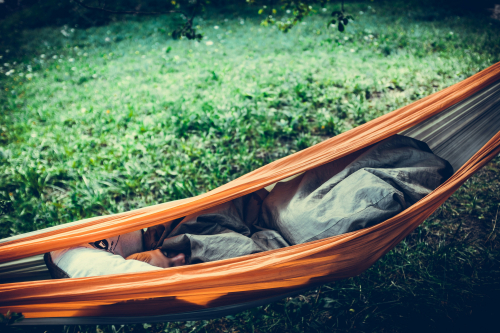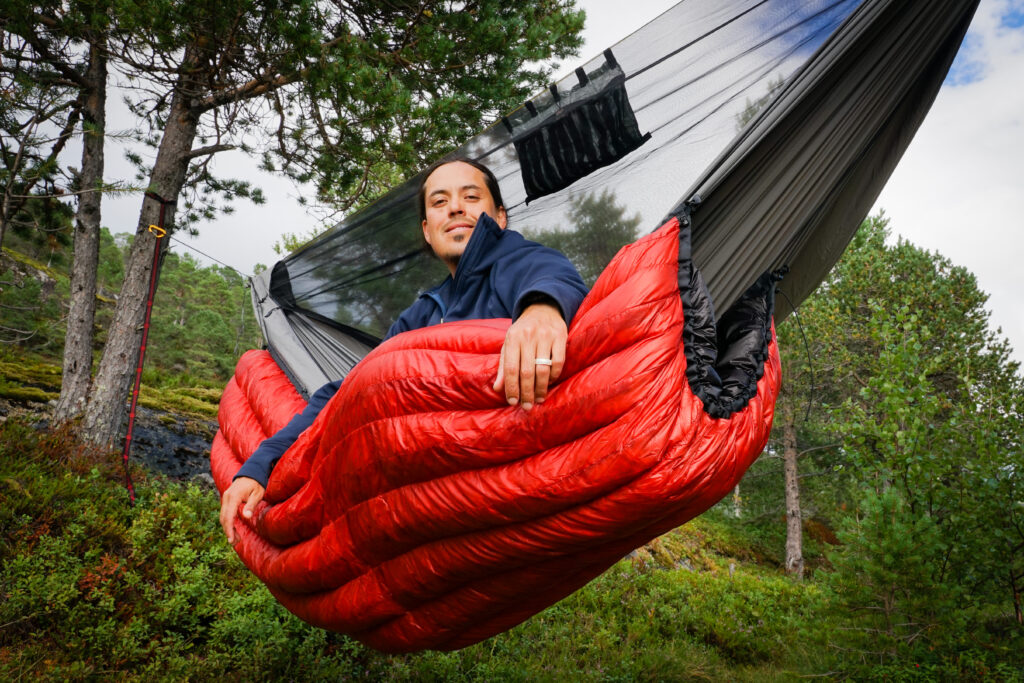Bug-Free Bliss: Conquering Hammock Camping in Mosquito Country

Hammock camping has surged in popularity in recent years, captivating adventurers with its unique blend of comfort and versatility. Unlike traditional tent camping, which requires a flat, debris-free surface, hammock camping offers the freedom to set up camp almost anywhere there are trees. This makes it an appealing option for backpackers, hikers, and nature lovers seeking an immersive outdoor experience. Hammocks provide a more elevated sleeping experience, free from uncomfortable rocks or uneven terrain, promoting better rest and rejuvenation. Moreover, hammock camping aligns with sustainable practices, leaving a smaller ecological footprint compared to traditional tent camping.
While hammock camping offers numerous advantages, it also presents a unique challenge: dealing with mosquitoes. These pesky insects can quickly turn a peaceful outdoor adventure into a frustrating and uncomfortable experience. Mosquitoes not only disrupt sleep but can also pose health risks, potentially transmitting diseases such as malaria, Zika, and West Nile virus.
Achieving a bug-free hammock camping experience is essential for maximizing the enjoyment and benefits of this outdoor activity. Uninterrupted sleep, the ability to fully immerse oneself in nature, and the prevention of potential health issues are all crucial factors that contribute to a successful and rejuvenating hammock camping trip. By addressing the challenge of mosquitoes, hammock campers can fully embrace the allure of this unique and rewarding outdoor adventure.
Choosing the Right Gear for Mosquito-Proof Hammock Camping
When choosing a mosquito-proof hammock, there are several key features to look for to ensure a comfortable and bug-free camping experience. These include:
- Integrated Bug Netting: A hammock with built-in mosquito netting is ideal for jungle or wet conditions where mosquitoes are prevalent. This type of hammock provides a seamless barrier against mosquitoes and other biting insects.
- Durable Materials: Look for hammocks made from heavy-duty, water-resistant materials like nylon or parachute nylon. These materials can withstand harsh weather conditions and provide a reliable barrier against mosquitoes.
- Easy Setup and Entry: Consider hammocks with features like double-sided zippers or knotless cordlock systems for easy setup and entry.
Essential Accessories for Mosquito Protection
In addition to a mosquito-proof hammock, several accessories can enhance your mosquito protection:
- Tarp or Rainfly: A tarp or rainfly can provide additional protection against rain and wind, which can help prevent mosquitoes from entering the hammock.
- Mosquito Net Options: Hammock-specific mosquito nets are designed to fit snugly around the hammock and provide a secure barrier against mosquitoes. Universal mosquito nets can also be used, but they may require additional setup and adjustments.
Clothing and Personal Protection Gear
To further enhance your mosquito protection, consider the following clothing and personal protection gear:
- Lightweight and Breathable Clothing: Choose lightweight, breathable clothing that allows for airflow and helps keep you cool. This can include moisture-wicking fabrics and loose-fitting clothing.
- Insect Repellents and Alternatives: Use insect repellents containing DEET, picaridin, or oil of lemon eucalyptus to repel mosquitoes. Natural oils like citronella and lemongrass can also provide some protection. Additionally, consider wearing clothing treated with insect repellents or using mosquito-repellent clothing.
By selecting the right gear and following these guidelines, you can ensure a comfortable and bug-free hammock camping experience.
Site Selection Strategies for Mosquito-Free Camping
When selecting a campsite, it is crucial to avoid areas that attract mosquitoes. Key characteristics to look for include:
- Distance from Stagnant Water Sources: Mosquitoes thrive in standing water. Opt for campsites that are far from ponds, lakes, and other bodies of water where mosquitoes can breed.
- Higher Ground or Breezy Locations: Mosquitoes are less prevalent in areas with good airflow. Choose campsites on higher ground or those with a gentle breeze to minimize the presence of these pests.
Setting Up Camp for Mosquito Defense
To ensure a mosquito-free camping experience, consider the following setup strategies:
- Utilizing Natural Barriers: Use windbreaks, foliage, or other natural barriers to block wind and create a more stable environment. This can help reduce the likelihood of mosquitoes entering your campsite.
- Proper Placement of Hammock and Mosquito Net: Position your hammock and mosquito net strategically to maximize effectiveness. Ensure the net is securely attached and the hammock is at a height that allows for good airflow.
Preparing the Camping Area
Before setting up camp, take the following steps to create a bug-free environment:
- Clear Debris and Potential Mosquito Breeding Grounds: Remove any debris, leaves, or branches that could provide a breeding ground for mosquitoes. This includes clearing any standing water from flowerpots, buckets, or other containers.
- Creating a Clean and Clutter-Free Campsite Environment: Keep your campsite clean and organized to discourage mosquitoes from inhabiting the area. Avoid leaving food or trash lying around, as these can attract mosquitoes.
By following these site selection strategies, you can significantly reduce the presence of mosquitoes and enjoy a more comfortable and peaceful camping experience.
Effective Mosquito Management for Camping
To keep mosquitoes at bay while camping, consider the following techniques:
- Using Mosquito Coils and Lanterns: Mosquito coils and lanterns are effective ways to repel mosquitoes. These devices release a smoke that contains natural oils that mosquitoes find unpleasant. This can be especially useful for campers who prefer to stay outdoors without the need for bug nets or screens.
- Setting Up Mosquito Traps: Mosquito traps are devices that attract and capture mosquitoes. These traps usually use CO2, heat, or light to attract mosquitoes and then capture them in a net or on a sticky pad. While they are not foolproof, they can significantly reduce the number of mosquitoes around your campsite.
Natural Methods for Mosquito Control
For a more eco-friendly approach, consider the following natural methods:
- Planting Mosquito-Repelling Plants: Certain plants, such as citronella, lemongrass, and lavender, have natural oils that repel mosquitoes. Planting these around your campsite can create a mosquito-free zone without the need for chemicals.
- Creating Smoke Barriers: Campfires can be used to create smoke barriers that repel mosquitoes. Certain types of wood, such as cedar or cypress, release oils that mosquitoes find unpleasant. This can be an effective way to keep mosquitoes away without using chemicals.
Safe and Eco-Friendly Mosquito Control Practices
When using mosquito control products, ensure they are safe and eco-friendly:
- Avoiding Harmful Chemicals in Bug Sprays: Opt for bug sprays that use natural ingredients or DEET, picaridin, or oil of lemon eucalyptus. Avoid using bug sprays that contain harmful chemicals like permethrin.
- Responsible Disposal of Mosquito Control Products: Always dispose of mosquito control products responsibly. This includes properly disposing of used mosquito coils and traps, and ensuring that any chemicals used are not contaminated with water or other substances that could harm the environment.
By incorporating these techniques and practices into your camping routine, you can effectively manage mosquitoes and enjoy a more comfortable and peaceful outdoor experience.
Nighttime Comfort and Sleep Solutions for Mosquito-Prone Camping
Achieving a good night’s sleep is crucial when camping in mosquito-infested areas. To ensure maximum comfort and support, pay close attention to your bedding and hammock setup. Invest in high-quality insulation, such as a sleeping pad or quilt, to maintain warmth and prevent mosquitoes from biting through the fabric. Properly adjusting your hammock can also contribute to a more restful sleep by providing the right level of support and tension.
Enhancing Sleep Hygiene in Bug-Prone Environments
Even in the face of outdoor challenges, it’s important to maintain good sleep hygiene. Consider using earplugs and eye masks to block out any disruptive noises or light that could interfere with your sleep. Additionally, establish a calming bedtime routine, such as reading or practicing relaxation techniques, to help you unwind and drift off to sleep despite the presence of mosquitoes.
Tips for Managing Nighttime Emergencies
Despite your best efforts, unexpected mosquito invasions can still occur. If you find yourself dealing with a sudden influx of mosquitoes, act quickly to minimize their impact. Ensure that your hammock’s mosquito netting is securely in place and consider using a portable fan or repellent device to create a barrier against the insects. If the situation becomes untenable, be prepared to relocate your camp to a more mosquito-free area, prioritizing your safety and comfort.
By addressing these nighttime considerations, you can maximize your chances of enjoying a peaceful, bug-free slumber, allowing you to wake up refreshed and ready to embrace the wonders of the great outdoors.
Outdoors Mosquito-Free
To ensure a mosquito-free hammock camping experience, focus on the following key strategies:
- Select a mosquito-proof hammock with integrated bug netting and durable materials.
- Utilize essential accessories like tarps, rainflies, and mosquito nets to create a secure barrier against insects.
- Choose campsites strategically, avoiding areas near stagnant water sources and opting for higher ground or breezy locations.
- Employ a variety of mosquito-repelling techniques, including using coils, lanterns, and natural plant-based methods.
- Prioritize nighttime comfort and sleep hygiene by properly adjusting your hammock and maintaining a calming bedtime routine.
The Benefits of Mosquito-Free Camping
Enjoying the great outdoors without the constant annoyance of mosquitoes can truly elevate your camping experience. By implementing these strategies, you can immerse yourself in nature’s tranquility, free from the disruptive buzzing and biting of these pests. This allows you to fully reap the benefits of hammock camping, such as improved rest, a deeper connection with the environment, and a greater sense of adventure and freedom.
Embrace the Outdoors with Confidence
With the knowledge and tools provided in this guide, you can now confidently embark on your next hammock camping adventure, ready to conquer any mosquito-related challenges that come your way. Embrace the great outdoors, revel in the beauty of nature, and create unforgettable memories, all while enjoying a peaceful, bug-free experience. The freedom and comfort of hammock camping await – go forth and explore the wilderness, mosquito-free!
You may also be interested in: Backpackers & Hikers: Essential Hammock Ridgeline Setup for Lightweight Comfort
Embark on your next adventure with Hammock Gear’s custom quilts! Tailor your comfort for the wild – choose your style, warmth, and size to craft your perfect eco-friendly outdoor companion, or grab a complete ultralight kit. Made in the USA for unparalleled quality and comfort. Trusted since 2009. Shop Now and tap into a community of nature lovers!⭐
Related Posts
The Best Camping Hammocks of 2024 – A Buyer’s Guide by Hammock Gear
A good camping hammock can completely transform how you experience…
Can Napping Hurt You? Unveiling the Pros & Cons of Daily Zzz’s
Napping, the act of taking a brief sleep during the…


